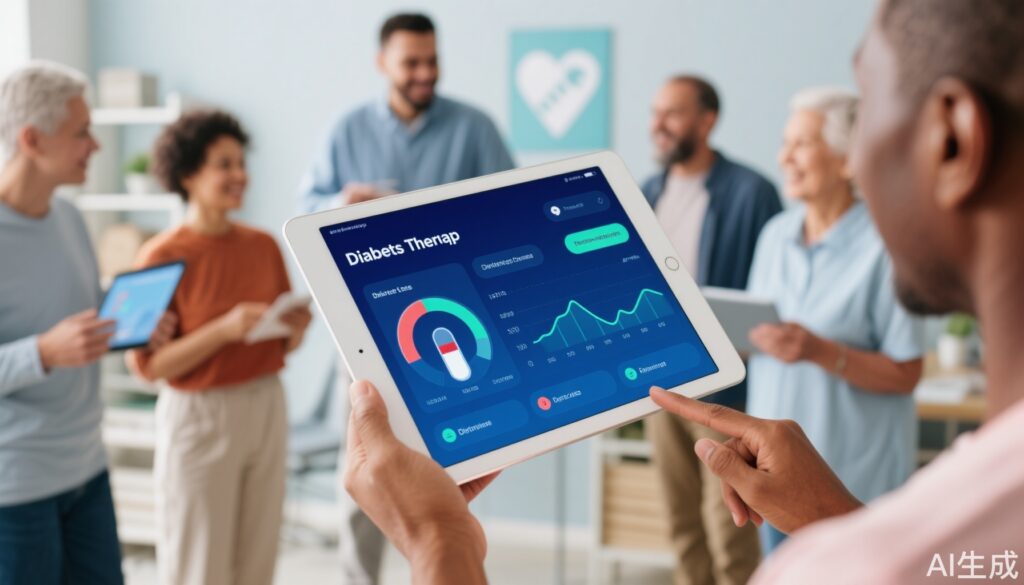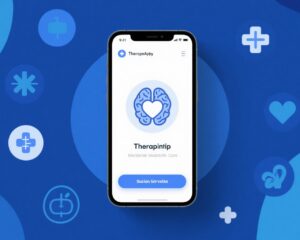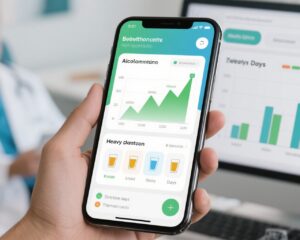Highlight
The BRIGHT trial is a pivotal randomized controlled study assessing AspyreRx, an FDA-approved digital therapeutic that delivers cognitive behavioral therapy to improve glycemic control in patients with type 2 diabetes who experience residual hyperglycemia despite stable pharmacotherapy. The trial adopts a pragmatic, virtual, and decentralized design to enhance the generalizability of findings across diverse clinical settings. It aims to establish both short-term (90 and 180 days) and long-term efficacy and safety outcomes, alongside impacts on healthcare utilization and medication use.
Study Background and Disease Burden
Type 2 diabetes mellitus (T2DM), characterized by chronic hyperglycemia resulting from insulin resistance and impaired beta-cell function, continues to escalate globally and in the United States. Despite the development of innovative pharmacotherapies targeting various pathophysiological mechanisms, accessibility and tolerability remain challenges. Residual hyperglycemia persists in many patients under stable medical regimens, posing increased risks for cardiovascular and microvascular complications.
Behavioral interventions, including lifestyle modification and psychological counseling, are foundational in T2DM management due to their beneficial effects on metabolic control and cardiovascular risk factors. However, access to conventional behavioral therapy is limited by resources, geographic barriers, and patient engagement challenges. Digital therapeutics, which use software-based interventions to support behavioral changes, have emerged as promising modalities to bridge these gaps.
Cognitive behavioral therapy (CBT) is especially relevant in managing cardiometabolic diseases because it targets maladaptive behaviors and emotional factors influencing disease management. Delivering CBT via digital platforms could enhance scalability and accessibility while maintaining therapeutic fidelity.
Study Design
The BRIGHT (Digital Therapeutic Based Investigation to Improve Glycemic Control in Patients With Type 2 Diabetes and Residual Hyperglycemia on Stable Medical Therapy) Trial (ClinicalTrials.gov Identifier: NCT05266625) is a randomized, controlled, multicenter, pragmatic trial with an open-label extension phase. It evaluates the hypothesis that AspyreRx improves glycemic control and other cardiometabolic parameters compared with a control application added to usual care.
The trial enrolls patients with T2DM who present residual hyperglycemia despite stable pharmacologic treatment. Enrolled participants are randomized to receive either AspyreRx—a digital therapeutic delivering CBT tailored to diabetes self-management—or a control application providing standard care reminders without behavioral intervention content.
The primary endpoints are changes in hemoglobin A1C levels at 90 and 180 days following intervention initiation. Secondary endpoints include safety assessments, changes in weight, blood pressure, medication adherence, quality of life, health care utilization, and long-term effectiveness over extended follow-up.
Importantly, the design incorporates a virtual, decentralized model, enabling enrollment of diverse populations across multiple real-world clinical sites. This approach aims to improve external validity and applicability of results across heterogeneous patient groups.
Key Findings
Initial results demonstrate that AspyreRx significantly reduces hemoglobin A1C at 90 days relative to control, confirming its short-term efficacy in glycemic modulation. Patients using AspyreRx also experience improvements in secondary cardiometabolic measures such as weight and blood pressure, suggestive of comprehensive behavioral benefits.
Safety profiles indicate no significant adverse effects attributable to the digital therapeutic, underscoring its tolerability in routine clinical practice. Medication usage patterns suggest that AspyreRx may facilitate better adherence and potentially delay escalation of pharmacologic therapy.
The ongoing open-label extension promises insights into long-term sustainability of glycemic improvements and safety. Further analyses will elucidate effects on healthcare resource utilization and quality of life metrics.
Expert Commentary
Experts recognize the BRIGHT trial as a critical step in integrating digital therapeutics into standard diabetes care. Dr. Maria E. Canonico and colleagues highlight the significance of targeting residual hyperglycemia, a clinically challenging cohort with unmet therapeutic needs.
The trial’s decentralized design is praised for enhancing generalizability, addressing previous limitations of digital health studies often confined to select populations or academic centers.
Potential limitations include reliance on patient engagement with the digital platform and variability in adherence. Nevertheless, the FDA approval of AspyreRx reinforces its clinical utility when combined with conventional therapy.
Conclusion
The BRIGHT trial represents an innovative approach to improving glycemic control in type 2 diabetes via a scalable digital therapeutic delivering cognitive behavioral therapy. Early data confirm AspyreRx’s efficacy and safety at reducing hemoglobin A1C over 90 days in patients with residual hyperglycemia. The trial’s pragmatic, virtual design ensures that findings will be broadly applicable across diverse real-world settings.
Future research and longer-term follow-up will clarify the durability of glycemic improvements, impact on cardiometabolic risk factors, healthcare utilization, and patient-centered outcomes. These insights will be vital to optimizing integration of digital therapeutics into comprehensive diabetes management frameworks, ultimately addressing longstanding behavior-related care gaps.
References
Canonico ME, Hsia J, Masoudi FA, Bosworth HB, Greene S, Batch BC, Hamilton N, de Araujo TB, Jackson M, Broussard M, Gooden Z, Guthrie NL, Hansell B, Matteliano-Madu L, Mosesso K, Berman MA, Bonaca MP. Digital Therapeutic Based Randomized Investigation to Improve Glycemic Control in Patients With Type 2 Diabetes and Residual Hyperglycemia on Stable Medical Therapy: Rationale, Design, and Baseline Characteristics of the BRIGHT Trial. J Am Heart Assoc. 2025 Aug 5;14(15):e038737. doi: 10.1161/JAHA.124.038737. Epub 2025 Jul 17. PMID: 40673521.


